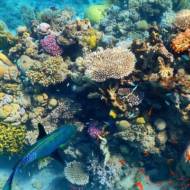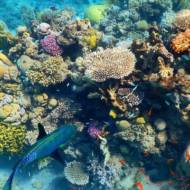Your cart is currently empty!

Eilat Sponges Could Transform Water Purification, Researchers Say

Eilat Sponges Could Transform Water Purification, Researchers Say

Sponges from the Gulf of Eilat found to absorb the highest concentrations of molybdenum ever recorded in any organism on Earth.
By Pesach Benson, TPS
A unique bacterium that thrives in partnership with marine sponges holds the potential to purify water sources contaminated with toxic metals, Israeli researchers have found.
A recent study conducted by Tel Aviv University researchers revealed that sponges in the Gulf of Eilat have developed a highly original tactic to deter predators.
These ancient marine organisms have developed a method of incorporating a toxic precious metal, molybdenum, into their bodies as a defense mechanism.
The research focused on a particular species of sponge, Theonella conica, which is found in the coral reefs of the Gulf of Eilat. The researchers were intrigued by the sponge’s ability to accumulate and store unprecedented levels of molybdenum.
In living organisms, including humans, molybdenum is a vital trace element that is a component of certain enzymes involved in detoxifying harmful compounds, such as sulfites. It plays a role in the metabolism of nitrogen, sulfur, and carbon.
“Sponges are the earliest multicellular organisms known to science, and they play a significant role in marine environments,” said PhD student Shani Shoham, who led the research along with Professor Micha Ilan from the university’s School of Zoology.
“They have the ability to process and filter enormous amounts of seawater daily, up to 50,000 times their body weight. This allows them to accumulate various trace elements from the water, including potentially toxic ones like molybdenum and arsenic,” Shoham added.
The study identified a specific bacterium, Entotheonella sp., as playing a crucial role in this symbiotic relationship. The bacterium acts as a “detoxifying organ” by accumulating molybdenum within the sponge’s body and converting it from its toxic soluble state into a harmless mineral.
This process not only protects the sponge from the toxic effects of the metal but also serves as a warning to potential predators.
Shoham’s research was inspired by earlier findings from more than 20 years ago when samples of Theonella conica collected from the coral reefs of Zanzibar in the Indian Ocean were found to contain high concentrations of molybdenum. The goal of the new study was to determine whether similar concentrations could be found in the same species in the Gulf of Eilat, where the sponge grows at depths of more than 27 meters.
The results were astonishing. The sponges from the Gulf of Eilat contained the highest concentrations of molybdenum ever recorded in any organism on Earth, with levels reaching 46,793 micrograms per gram of dry weight.
This discovery prompted further investigation into how the sponges manage to cope with such high levels of toxic metal.
“Like all trace elements, molybdenum is toxic when its concentration exceeds its solubility in water,” Shoham explained.
“However, sponges are unique in that they are essentially hollow masses of cells with no organs or tissues. In Theonella conica, up to 40% of the body volume is made up of a microbial society, consisting of bacteria, viruses, and fungi that live in symbiosis with the sponge.”
Despite the high demand for molybdenum in industry, particularly for use in high-strength steel alloys, Shoham emphasized that it would be impractical to harvest the metal from these sponges.
“While the concentration of molybdenum in the sponges is exceptionally high, the actual amount of metal that could be extracted from each sponge is minimal, and the sponges themselves are relatively rare,” she said.
However, the study opens the door to future research on the bacteria’s ability to accumulate and neutralize other toxic metals.
A previous study by the same lab found that a close relative of Theonella conica, known as Theonella swinhoei, also contains high concentrations of arsenic and barium, with Entotheonella sp. bacteria playing a similar role in detoxifying these metals.
Shoham suggested that continued research on these bacteria could have practical applications in treating water sources contaminated with toxic metals, such as arsenic, which poses a serious health risk to millions of people worldwide.
The ability of these bacteria to neutralize toxic elements could potentially be harnessed for environmental remediation, offering a natural solution to a global problem.
The research was recently published in the peer-reviewed Science Advances.
Do You Love Israel? Make a Donation – Show Your Support!
Donate to vital charities that help protect Israeli citizens and inspire millions around the world to support Israel too!
Now more than ever, Israel needs your help to fight and win the war — including on the battlefield of public opinion.
Antisemitism, anti-Israel bias and boycotts are out of control. Israel’s enemies are inciting terror and violence against innocent Israelis and Jews around the world. Help us fight back!
The post Eilat Sponges Could Transform Water Purification, Researchers Say first appeared on United with Israel.
United with Israel